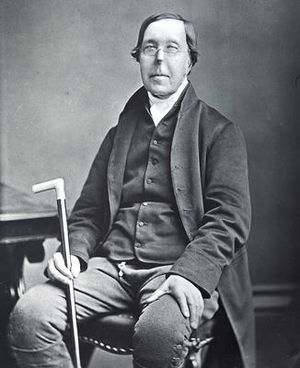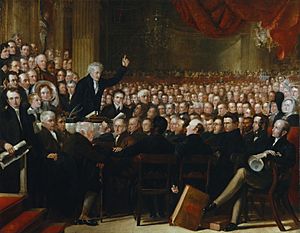William Smeal facts for kids
Quick facts for kids
William Smeal
|
|
|---|---|

Smeal in 1865
|
|
| Born | 1792 |
| Died | 1877 (aged 84–85) |
| Nationality | Scottish |
| Known for | founding the Glasgow Emancipation Society |
| Family | Jane Smeal |
William Smeal was a Scottish grocer who lived from 1792 to 1877. He was a member of the Quakers, a religious group known for their peaceful beliefs. William Smeal was also a strong supporter of the movement to end slavery, known as an abolitionist. He came from Glasgow, Scotland, and worked hard to fight against injustice.
Contents
Who Was William Smeal?
William Smeal was born in 1792. He and his brother, James, both worked as grocers. They were both very active in the fight against slavery in Scotland. William Smeal is famous for starting the Glasgow Anti-Slavery Society in 1822. This group later became known as the Glasgow Emancipation Society.
William was also known as a tea merchant. His sister, Jane Smeal, was also a very important leader in the abolitionist movement. They both believed strongly that slavery was wrong and worked to end it.
The 1840 Anti-Slavery Conference
In 1840, William Smeal went to a big meeting called the World Anti-Slavery conference. This meeting lasted a whole week. It was organized by Joseph Sturge from Birmingham.
At this conference, William Smeal was included in a special painting. He was shown with other important people who wanted to end slavery. These included other Quakers, business people, bankers, and abolitionists from many countries. People came from America, South Africa, and Jamaica to attend this important event.

William Smeal's Impact
William Smeal's family was quite unique in Scotland because they were Quakers. In 1851, a survey found that there were fewer than 400 Quakers living in Scotland.
William Smeal passed away in 1877. His obituary, which is like a notice about someone's death, mentioned how he fought against unfairness his whole life. He spoke out against many things he thought were wrong.
Fighting for Justice
William Smeal opposed several unfair practices and laws:
- Corn Laws: These were laws that made food expensive for poor people.
- Alcohol: He believed alcohol caused problems in society.
- Stamp Duties: These were taxes on paper documents, which made things more expensive.
- Capital Punishment: This means the death penalty. He believed it was wrong to execute people.
- War: As a Quaker, he was against all forms of war and violence.
- Slavery: This was his main cause, and he worked tirelessly to end it.
William Smeal is remembered as a great example of how a Quaker could help improve public life. His sister, Jane Wigham, was a key leader in the anti-slavery movement. Her stepdaughter, Eliza Wigham, also became a famous campaigner for ending slavery and for women's rights.
 | Janet Taylor Pickett |
 | Synthia Saint James |
 | Howardena Pindell |
 | Faith Ringgold |

